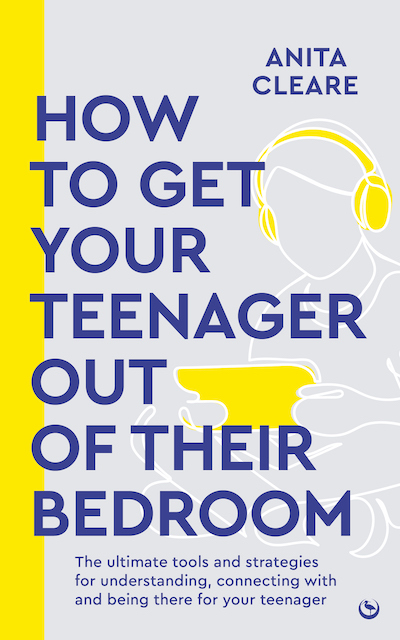Parenting teenagers in the digital age comes with unique challenges – navigating technology, understanding social pressures, and coping with the emotional roller-coaster of adolescence. Anita Cleare, parenting expert and author of How to Get Your Teenager Out of Their Bedroom, offers actionable insights and heartfelt advice to help parents reconnect with their teens. In this interview with London Mums, Anita shares practical strategies, personal anecdotes, and the hope every parent needs to guide their teenagers toward independence while preserving a loving connection.![]()
![]()
![]()

What inspired you to write this book? Was there a particular moment when you realised parents were desperate for guidance with teenagers in this digital age? ![]()
![]()
![]()
Anita: The idea came from an article I wrote describing how much I missed my teenage son even though he was still living in the same house with me. He just didn’t want to talk to me any more. The article generated hundreds of comments from parents saying how much they identified with it. So many parents emailed me directly to tell me their stories, so I knew I had hit a nerve.

Many parents feel frustrated or even hurt when their teen withdraws into their room. What’s your advice for managing those emotions while staying connected?
Anita: We invest so much love, time and energy into our children. When they turn away from us, it hurts. We can see that they still need our guidance, but they won’t take our advice and that can lead to frustration and worry. It’s essential parents find ways to resolve these thoughts and feelings away from our children – whether that’s through friends, professional support, or good self-care. If we throw our big emotions at our teens, it makes everything worse.
Your book outlines four key drivers behind teenage behaviour. Could you give us a sneak peek into what these are and how parents can address them?
Anita: In order to become independent, teenagers need to separate from their parents, work out who they are and how they fit into the wider world and take control of their own lives. When we unpick most teenage behaviour, we can usually find at least one of these drivers at the root. Although it doesn’t always make them easy to live with, understanding that your teen’s behaviour is driven by child development rather than flaws in their character can really help parents stay positive.
Technology and gaming are hot-button issues for parents. How can mums encourage healthy screen habits without becoming the ‘nagging parent’?
Anita: Nagging doesn’t work. It is far more effective to treat teens like the young adults we want them to become and hold them accountable for their decisions. For example, make recreational tech time conditional on positive activities (such as homework, sport and chores) being completed first and stick to those rules consistently.
Social anxiety is on the rise amongst teens. What small changes can parents make to help their teenager feel more comfortable engaging with the world outside their bedroom?
Anita: Many teens experience heightened anxiety. To help build their confidence, look for small wins – tiny achievable steps that take them to the edge of their comfort zone but are not so difficult that they give up. For example, if your teen is anxious about joining a new club, they might start off just by walking past or watching or chatting to the coach/teacher on their own.
What’s one simple strategy parents can use today to spark conversation with a silent or distant teenager?
Anita: It’s all about timing rather than topics! There is no point trying to have a conversation when your teen is all churned up and brooding about something that happened at school. Make them a smoothie or a hot chocolate and pop into their room with a smile. If the time is right, they will talk. If it isn’t, just put the drink down and leave. Even if it doesn’t result in a conversation, they will know that you care and are available.
You mention case studies and real-life scenarios in the book. Is there a story that really stood out for you during your research or coaching sessions?
Anita: Lots of the case studies I use are examples of when I got it wrong myself as a parent. Parenting teens isn’t easy, even when we know what we should be doing in theory. One of the case studies is a letter sent to me by a single dad whose daughter was self-harming. That one stood out not just because of the difficult topic but his honesty in saying he had no idea how to understand her behaviour or what to do. I think many parents experience those moments of powerlessness when we are trying to support our teens.
What’s the biggest misconception parents have about modern teenagers? And how does your book help challenge that?
Anita: We often look at teenagers and think they should know better. Or that they are doing it deliberately. But they really aren’t. There is so much developmental work going on in their brains which can really throw their behaviour off kilter. Be patient, they will get there in the end!
For busy working mums, balancing work and family can feel overwhelming. What are some practical ways they can foster connection with their teens, even on the most hectic days?
Anita: When you’re busy, it’s tempting to cram in some parenting every time your teen emerges from their room and jump on the opportunity to remind them about their homework or to nag them about the dishwasher. If you only have a few minutes with your teen, sometimes it’s better to invest that time in just reminding them you still like them. A smile, a joke, a pat on the back, the offer of a sandwich – these are the micro-bridges that help connect with teens.
Your book focusses on being the parent teens need, not just the parent we think we should be. How can parents shift their mindset and embrace that role?
Anita: My mantra in the book is ‘prioritise relationship over principle’. Teens need our love and patience more than our advice. Be the grown up, walk away from conflict and look for the compromises rather than standing on principles about how things should/shouldn’t be.
Many parents say they struggle with “letting go” as their child grows up. Do you offer any advice in the book for coping with this transition?
Anita: We need to take responsibility for our side of this transition and for our own happiness. This is the time for self-compassion. Be kind to yourself. Look after yourself, physically and mentally. Manage your own wellbeing actively and go looking for some joy. This is a moment for reinvention. Explore new passions, try out new hobbies, reconnect with friends and find ways to lighten the load and laugh (lots).
Finally, what’s the one piece of advice you hope every mum takes away after reading your book?
Anita: Most of all, I want parents to finish this book with hope. Because no matter how hard it feels right now, no matter how distant, disengaged, rude or sad your teenager is today, it won’t always be this way. They will blossom into lovely young adults. By believing in their bright future, you are believing in them. And no matter what your teenager says or does, they need to feel that you are behind them.
![]()
Anita Cleare is a parenting expert, who writes the award-nominated ‘Thinking Parenting’ blog and delivers expert parenting seminars. She is also the author of ‘How To Get Your Teenager Out Of Their Bedroom, The ultimate tools and strategies for understanding, connecting with and being there for your teenager, which was published this year on the 10th September.



